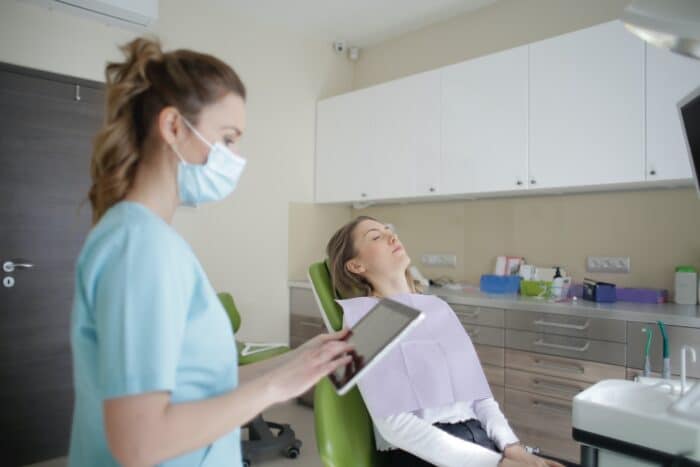If you have ever been interested in entering the industry of healthcare, you might have considered pursuing a career in medical assistance.
So what is a medical assistant? What do they do?
Medical Assistants are healthcare workers that support physicians and other healthcare professionals with daily administrative and clinical tasks. Their duties range from answering calls and scheduling appointments to assisting physicians with bedside procedures.
If you considered medical assistance as a career, you might be wondering why you should become one.
Read on to find out the top reasons to become a medical assistant, accompanied by the top reasons to avoid becoming a medical assistant.
12 Reasons to Become a Medical Assistant
Medical assistance is known to be a rewarding career, especially for those who wish to work on the frontlines and help in delivering optimal patient care.
See also: Is Medical Assistant a Good Career?
However, here are the top 12 reasons to become a medical assistant-
1. Less education required or a Low entry barrier
When compared to other core healthcare careers, the educational requirements for becoming a medical assistant are relatively less. Generally, a high school diploma or GED is the only minimum requirement to work as a medical assistant.
However, it is worth noting that many employers prefer to hire candidates who have completed an accredited medical assistant training program. Such programs are available in various formats, including online courses and postsecondary institutions such as community colleges or trade schools.
Also read: Medical Assistant Program
There are different types of medical assistant programs, with certificate programs and associate degree programs being the most common. Certificate programs are generally shorter, typically taking several months to complete. On the other hand, associate degree programs usually require up to 2 years of study.
Read: Medical Assistant Educational Requirements
2. Possibility of quick online certification
Getting certified as a medical assistant is always beneficial as it can greatly enhance your career prospects and make you shine more in front of potential employers. Additionally, the process of earning a medical assistant certification is generally easy.
There are various types of medical assistant certifications available, the most common and legitimate ones including CMA (Certified Medical Assistant), RMA (Registered Medical Assistant), and CCMA (Certified Clinical Medical Assistant).
Also see: Which Medical Assistant Certification is the Best?
To become certified, you will need to successfully pass a certification exam. However, it is important to note that prior to taking the exam, you must fulfill the eligibility criteria by completing an approved medical assistant training program.
Read more: How Long Does it Take to Become a Medical Assistant
3. Good job outlook
The job outlook for medical assistants is promising, with a high level of job security. According to data from the U.S. Bureau of Labor Statistics (BLS) in 2021, the demand for medical assistant positions is projected to grow by 16% by the year 2031.
This growth rate is considerably higher than the average for many other careers, indicating a strong and sustained demand for medical assistants in the coming decade.
Read: Medical Assistant Job Outlook
4. Decent Pay
The BLS also reported the national average income for medical assistants to be around $37,190.
However, it is important to consider that these salary figures can vary based on factors such as level of experience, the specific healthcare setting in which one works, and the job location.
Overall, medical assistants can expect to receive competitive compensation that reflects their skills, expertise, and the demands of their role within the healthcare industry.
See more: Certified Medical Assistant Salary
5. Flexible Schedule
Medical assistants often have flexibility in their work schedules, particularly in smaller private practices, compared to larger healthcare facilities such as hospitals. The standard full-time schedule for most medical assistants generally consists of 40 hours per week, however, there are various scheduling options available.
In addition to full-time positions, medical assistants also have the opportunity to choose part-time hours, overnight shifts, weekends, or even 12-hour shifts, depending on the specific needs and operations of the healthcare facility.
Also see: Medical Assistant Hours
6. Ability to Help Others
Medical assistants play an important role as the initial point of contact for patients during their medical office visits. This responsibility allows them to have a direct impact on alleviating patients’ initial anxiety and addressing their concerns.
Additionally, medical assistants contribute to ensuring effective communication between patients and their medical teams. They assist in ensuring that patients are well-informed about their care by providing them with after-visit instructions and offering guidance on scheduling follow-up appointments.
7. Fast-Paced Work Environment
As a result of the broad scope of duties and the high patient volume in medical offices, medical assistants often have to multitask. They need to efficiently manage multiple tasks simultaneously to ensure the smooth functioning of the healthcare facility. The pace of work in medical offices can be fast-paced due to the need to attend to the needs of numerous patients within a given timeframe.
Hence, medical assistants must possess strong organizational skills, the ability to prioritize effectively, and the capacity to work efficiently in a dynamic and fast-paced environment.
Read: Where Can Medical Assistants Work
8. Variety of Work Environments
Medical assistants also have the opportunity to work in diverse work environments, providing them with the flexibility to choose a setting that aligns with their preferences and professional goals. These settings can include hospitals, physician private practices, optometry offices, and outpatient clinics, among others.
Hospitals generally offer a dynamic and fast-paced environment with a wide range of medical specialties and departments. Private practices, on the other hand, often provide a more personalized and intimate setting where medical assistants can build strong relationships with patients and healthcare professionals.

Do You Want To Become a Medical Assistant? Check Out Free Medical Assistant Masterclass!
In our masterclass you learn:
- How to be a medical assistant faster…in just 4 months!
- Avoid student debt & driving to classes
- #1 thing employers want from Medical Assistants
- How to stand-apart & get a university certificate for a strong resume
9. Working in Many Specialties
Medical assistants have the flexibility to work in diverse specialties, including primary care, orthopedics, ophthalmology, and others.
You can find a medical assistant specialty that caters to your interests and allows you to make a valuable impact. The versatility of medical assisting offers numerous opportunities for professional growth and satisfaction.
10. Perform a Variety of Tasks
Medical assistants are responsible for a wide range of duties that can be categorized into two main areas: clinical tasks and administrative tasks.
By performing both clinical and administrative tasks, medical assistants contribute significantly to the overall functioning of medical practice.
They play a crucial role in patient care while also providing essential support in maintaining the administrative aspects of the healthcare setting. Hence medical assistants are also known as the backbone of the healthcare industry.
11. Good Experience for Advanced Healthcare Careers
In addition to clinical knowledge which may include anatomy, pharmacology, and diseases, healthcare workers such as medical assistants also need a comprehensive understanding of how a medical office functions. This knowledge ensures that patients receive the necessary care and support throughout their healthcare journey.
As a medical assistant, you gain valuable firsthand experience in a healthcare environment. This experience not only allows you to contribute directly to patient care but also provides insight into the intricacies of healthcare operations. It prepares you for future success in more advanced healthcare careers, should you choose to pursue paths such as nursing or becoming a physician assistant.
By working as a medical assistant, you develop the necessary qualities and acquire the knowledge base needed to navigate and thrive in the challenging healthcare field. The experience gained in this role serves as a solid foundation for further professional growth and advancement in your healthcare career.
Also see: How to get Medical Assistant jobs with no experience
12. Ability to Go to Instruction Schools
Becoming a medical assistant also opens doorways to instruction in schools. If you have a passion for teaching and guiding others in their career aspirations, becoming a medical assistant instructor is a rewarding choice.
In the United States, there are numerous training programs available for aspiring medical assistants, offered in various formats such as in-person and online. Experienced medical assistants are in high demand to contribute their knowledge and expertise in training the next generation of professionals.
Also see: Medical Assistant On-the-Job Training
Reasons to Avoid Becoming a Medical Assistant
Even though many perks and rewards are related to being a medical assistant, this might not be the best career choice for everyone.
Here is why:
1. Few Advancement Opportunities
In terms of career advancement, medical assistants may have limited opportunities compared to other healthcare professions. Advancement options for medical assistants include obtaining certifications or taking on supervisory roles.
However, if one desires to pursue a different healthcare career, such as a nursing assistant or clinical laboratory scientist, additional education and training are generally required.
Also read: Medical Assistant Degree vs Certificate
2. Can be Stressful
Working in healthcare settings requires medical assistants to thrive in fast-paced and dynamic environments. Hence, they need to maintain organization, especially during hectic periods throughout the workday.
If you find it challenging to perform well in stressful and fast-paced work settings, a career in medical assisting may not be the most suitable fit for you.
On a typical workday, medical assistants are responsible for multitasking and managing multiple tasks simultaneously. They also have extensive patient interaction, necessitating exceptional customer service skills to address patient concerns and complaints effectively.
Also see: Medical Assistant Skills
3. May Need to Draw Blood
Drawing blood is a frequently performed procedure in healthcare settings and for medical assistants.
If you are uncomfortable or unwilling to perform blood draws, it is important to ensure that the specific job you are interested in does not include this requirement.
Alternatively, you may consider pursuing a medical assistant role that primarily focuses on administrative tasks, where blood draws are not typically part of the job responsibilities.
Also see: Can Medical Assistants Draw Blood?
4. May Need to Be on Your Feet a Lot
The amount of time spent on your feet as a medical assistant can vary depending on the work setting. Mostly, medical assistants need to be on their feet for the majority.
However, if your role primarily involves administrative tasks, the need for constant movement may be reduced.
5. May Have to Work Longer Hours
Larger hospitals, in particular, often experience a high volume of patients, resulting in packed schedules and potential delays. As a result, medical assistants in such settings may need to arrive earlier or stay later to ensure all tasks are completed.
Furthermore, certain positions may require medical assistants to work overnight shifts, weekends, or even during holidays to provide continuous healthcare services. Flexibility in scheduling is essential in these cases.
Related Resources:
Related Articles
-
How to Be Successful in College in 2022 – 7 Simple Tips to Succeed
-
How Do Scholarships Work? Read This First…Truth is Shocking
-
7 Best College Majors 2024: What Should I Major In?
-
How to Choose a College – 10 Things You Must Consider in 2024
-
Why Go to College? Top 13 Benefits for Adult Students in 2022
-
Top 5 Best Alternatives to Community College for 2024











